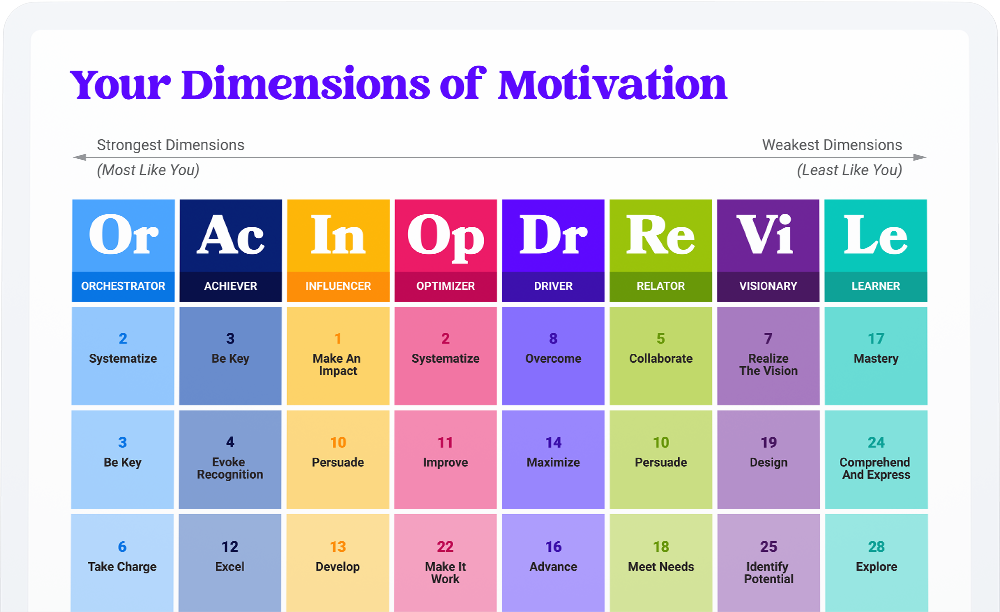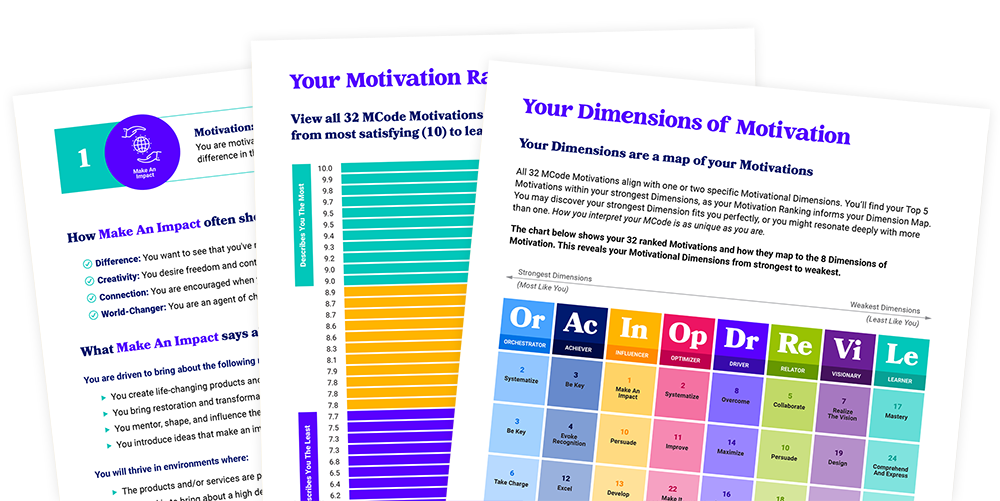MCode vs Enneagram
Understanding personality and emotional patterns improves interpersonal and team dynamics, but high-performance organizations need to move beyond personality and tap into motivation and its practical application in the workplace.

Self-awareness and personal growth
While the Enneagram helps people better understand their emotional patterns and identify pathways for self-improvement and growth, discovering one’s MCode reveals WHY they have specific strengths or encounter specific challenges.
Put another way…
- Enneagram highlights what drives fears, desires, and emotional responses, and helps people better navigate relational dynamics.
- MCode explains intrinsic motivations that drive satisfaction, fulfillment, and behaviors like engagement, performance, interpersonal relations, productivity, and achievement.


Scary accurate results
Because Enneagram results are self-reported and responses are often based on who someone wishes to be or how they want to be perceived, results aren’t always accurate. Enneagram type descriptions and results also vary based on the source, which means how you experience and understand the Enneagram depends on where you get your information.
MCode’s narrative approach and proprietary science and technology ensure results are accurate, or as our customers say, “scary accurate.”
- There is one MCode. MCode doesn’t assess personality; it assesses lived experiences and satisfaction levels to uncover motivational patterns that drive behavior.
- The MCode assessment is narrative-based, which means it starts with a person’s own stories of peak life moments and asks questions related to their experiences and levels of satisfaction.
Work and life at their best
Enneagram’s personality profile helps people understand who they are, how they show up, how they feel, and how they are perceived. But personality dynamics alone don’t offer the actionable insights needed to achieve peak potential, shine bright, and be a star.
MCode explains why tasks are energizing or draining and easy or difficult, and why sometimes, even when in a role that matches their personality or uses their core strengths, someone can feel unhappy and unengaged.
The immediately relevant and actionable results MCode offers highlight what an individual needs to not only perform at their best and achieve success but also feel deeply satisfied and fulfilled. And when someone experiences work at its best, they can’t help but also experience life at its best.

Personality typing vs. Performance typing
Enneagram is a subjective theoretical framework for personality typing that describes patterns in how people interpret the world, manage their emotions, and interact with others. It classifies people into 9 types: the Reformer, the Helper, the Achiever, the Individualist, the Investigator, the Loyalist, the Enthusiast, the Challenger, and the Peacemaker.
Motivation Code is an objective, practical framework for performance typing that identifies motivational patterns of being, strength, personality, engagement, and performance that remain consistent. It maps a personalized spectrum of 8 Motivational Dimensions: Achiever, Driver, Influencer, Learner, Optimizer, Orchestrator, Relator, and Visionary.
Emotion vs. Performance:
The Enneagram operates on the principle that understanding core emotional drivers, desires, and fears is key to self-awareness, personal development, and personal growth.
MCode operates on the premise that people have distinct sets of abilities they are inherently motivated to use, which, when applied, lead to professional success and personal fulfillment.
Psychological patterns vs Motivational patterns:
Enneagram tests offer emotional understanding of personality and encourage the root exploration of feelings, reactions, and relational dynamics.
The MCode assessment reveals the “why” behind behavior; what intrinsic motivations drive a person’s actions, decisions, and satisfaction levels in various aspects of their work and lives.
Personal growth vs. Professional success
Enneagrams support profound personal growth and improved relationships by fostering a deep sense of empathy and emotional intelligence.
MCode helps individuals achieve peak performance by harnessing their unique motivations and natural advantages to improve productivity, engagement, and fulfillment.
MCode vs Enneagram Features Comparison
The scientific underpinnings of the MCode assessment and the Enneagram personality test offer distinct approaches to understanding human behavior, motivation, and personality. Both serve to enhance self-awareness, team cohesion, and ultimately, organizational performance, but the tools diverge significantly in methodology, development, and application.
MCode
Enneagram
Assessment framework
8 Motivational Dimensions shaped by a stacked ranking of 32 core Motivations.
9 personality types with dynamics like wings, stress/growth points, and triads.
Assessment origins
Based on validated science, deep research, and the underpinnings of The System for Motivated Abilities (SIMA) originally created by Art Miller.
Based in spirituality and philosophical theory. Expanded with psychological insights from individual narratives, experiences, and opinions.
Assessment science
Combines 60+ years of empirical science, qualitative research, and narrative psychology studying how personal stories reveal motivated abilities and how motivation drives fulfillment with decades of research into the dynamics of high performance.
A typology system that relies on anecdotal evidence, values, ethics, and self-reported insights. It lacks an empirical foundation, which makes it non-scientific. While popular, it has not been rigorously tested, researched, and validated.
Assessment creation
Created in the 1950s and originally administered through interviews. The application of technology introduced automation, improved consistency, eliminated potential bias from interviewers, and introduced scalability.
Contemporary teachings began in the 1950s. An assessment or type indicator test was not created until the 1990s. Many styles of assessments and tests have been created by people and companies with different approaches.
Assessment experience
Individuals share four meaningful personal stories of achievement and fulfillment and answer questions about their own lived experiences using a 1-10 ranking of satisfaction.
Depending on the chosen method, individuals either self-identify their type based on the type descriptions, or receive results by responding to a series of arbitrary statements by ranking accuracy.
Assessment consistency
The Motivation Code assessment experience and reports are always the same and only available through Motivations AI. It is objective, unbiased, and reliable.
There are many Enneagram assessments, which means, which means no two experiences are the same. The test is subjective and reporting quality and detail vary.
Assessment application
Applicable in personal growth, career planning, coaching, team dynamics, performance, leadership development, and organizational development.
Applicable in psychotherapy, coaching, spiritual growth, counseling, self-awareness, personal growth, and the improvement of interpersonal dynamics.
Assessment results
Ability-focused and centered around individuals’ natural advantages. Provides an understanding of how an individual is motivated to engage and why they behave the way they do at work and throughout life.
Personality-focused and centered around how an individual responds to change. Provides an understanding of individuals’ emotions and feelings, core desires, core fears, and their strengths and weaknesses.
Assessment challenges
Individuals may feel pressure to pick the “right stories” and find it difficult to decide which stories to share.
Self-reporting and self-identification introduce bias, which can lead to unreliability and inaccuracy.
MCode
Enneagram
Assessment framework
8 Motivational Dimensions shaped by a stacked ranking of 32 core Motivations.
9 personality types with dynamics like wings, stress/growth points, and triads.
Assessment origins
Based on validated science, deep research, and the underpinnings of The System for Motivated Abilities (SIMA) originally created by Art Miller.
Based in spirituality and philosophical theory. Expanded with psychological insights from individual narratives, experiences, and opinions.
Assessment science
Combines 60+ years of empirical science, qualitative research, and narrative psychology studying how personal stories reveal motivated abilities and how motivation drives fulfillment with decades of research into the dynamics of high performance.
A typology system that relies on anecdotal evidence, values, ethics, and self-reported insights. It lacks an empirical foundation, which makes it non-scientific. While popular, it has not been rigorously tested, researched, and validated.
Assessment creation
Created in the 1950s and originally administered through interviews. The application of technology introduced automation, improved consistency, eliminated potential bias from interviewers, and introduced scalability.
Contemporary teachings began in the 1950s. An assessment or type indicator test was not created until the 1990s. Many styles of assessments and tests have been created by people and companies with different approaches.
Assessment experience
Individuals share four meaningful personal stories of achievement and fulfillment and answer questions about their own lived experiences using a 1-10 ranking of satisfaction.
Depending on the chosen method, individuals either self-identify their type based on the type descriptions, or receive results by responding to a series of arbitrary statements by ranking accuracy.
Assessment consistency
The Motivation Code assessment experience and reports are always the same and only available through Motivations AI. It is objective, unbiased, and reliable.
There are many Enneagram assessments, which means, which means no two experiences are the same. The test is subjective and reporting quality and detail vary.
Assessment application
Applicable in personal growth, career planning, coaching, team dynamics, performance, leadership development, and organizational development.
Applicable in psychotherapy, coaching, spiritual growth, counseling, self-awareness, personal growth, and the improvement of interpersonal dynamics.
Assessment results
Ability-focused and centered around individuals’ natural advantages. Provides an understanding of how an individual is motivated to engage and why they behave the way they do at work and throughout life.
Personality-focused and centered around how an individual responds to change. Provides an understanding of individuals’ emotions and feelings, core desires, core fears, and their strengths and weaknesses.
Assessment challenges
Individuals may feel pressure to pick the “right stories” and find it difficult to decide which stories to share.
Self-reporting and self-identification introduce bias, which can lead to unreliability and inaccuracy.
MCode + Enneagram
When an organization uses both Motivation Code and the Enneagram to achieve a more nuanced understanding of its people (and help individuals and teams do the same), it can develop a deeply engaged workforce, create a burnout-resistant culture, and achieve greater outcomes.
Benefits of using the MCode assessment alongside the Enneagram include:
Improved interpersonal dynamics:
MCode and Enneagram drive self-awareness, emotional intelligence, and an understanding of why people feel, think, and act the way they do. This leads to meaningful personal growth, improved communication, better conflict resolution, and higher-quality relationships.
Greater professional success:
Individuals who know their MCode and Enneagram type know what makes them tick and how to tap into their innate greatness and natural advantages to show up at their best, perform at their best, contribute maximum value, and find deep fulfillment in their work.
Increased team effectiveness:
When teams have access to MCode and Enneagram insights, they better understand each others’ innate value, communication styles, and preferred work styles. This creates high-performance teams that collaborate well, move fast, and drive outstanding outcomes.
Personalized leadership approaches:
By understanding the emotional profile, motivations, and natural abilities and advantages of each team member, leaders can tailor assignments and roles to fit individuals so they feel safer and happier at work, and experience increased job satisfaction and productivity.
Stickier coaching and counseling:
Coaches and counselors can use MCode to customize their approaches to fit clients’ motivational drivers so they stick with their goals and achieve success, while the Enneagram provides navigational guidance on emotional responses and personality-based challenges.
You + MCode
Here is what’s included in your MCode results
While every Motivation Code assessment experience is the same, the personalized reports generated are not. Your MCode results are unique and every aspect of your report is tailored to who you are and how you show up in the world so the insights you gain are highly relevant and immediately applicable.
When choosing your individual or team MCode experience, you have two choices:
- MCode Lite
- MCode Premium
MCode Lite
MCode Lite reveals your MCode and provides the foundational insights that make the MCode assessment effective.
Your MCode reveals what makes you YOU and explains how you’re motivated and why it matters.
Discover what energizes and drains you, the work environments where you’ll thrive or struggle, your natural advantages and disadvantages, and how you’re naturally wired to contribute value to the world around you.
MCode Premium
MCode Premium reveals your MCode, provides foundational insights, and includes resources to help you apply your MCode.
When you choose or upgrade to MCode Premium, you gain access to interactive tools and resources to help you apply your MCode at work and throughout your life.
Applications focus on elevating your mindset, speaking confidently, refining your LinkedIn profile, crafting a compelling professional bio, making more persuasive pitches, and becoming a more effective negotiator.
MCode Foundational Insights
- Discover your Top 5 Motivations and how they drive your thoughts, decisions, and actions.
- See your ranking of 32 Motivations and how it shapes your MCode across 8 Dimensions.
- Understand your strongest Dimensions and potential blind spots to watch out for.
Additional Premium Tools
- Identify your Motivational Flow to unleash your full potential and perform at your best.
- Explore how Motivations impact how you show up.
- Compare your Motivations with another person’s Motivations to see how you interact with others.
Additional Premium Resources
- Personalized affirmations and declarations to cultivate a positive, growth mindset.
- A word bank of action verbs and power descriptors that align with your Motivational Dimension.
- LinkedIn enhancers to better communicate how you add value and why you are the best choice.
- Bio suggestions and sentence starters to highlight your unique strengths, motivations, and impact.
- Motivated pitching examples to tailor your sales message to each Motivational Dimension.
- Motivated negotiation suggestions to use motivation to negotiate more effectively.



